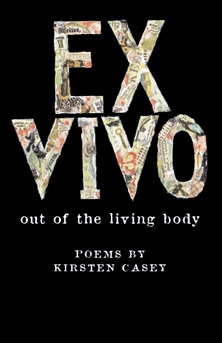
by Kirsten Casey
Publication Date: April 1, 2012
Available for $15.00 from your local bookstore or
www.amazon.com
Reviews
“Ex Vivo is a crazy quilt of a poetry book. What could unify such a varied collection of narrators—inebriated monks, famous painters, suicides, bad girls, and a woman who feels no pain? What could stitch together subjects as disparate as organ donors, middle names, anonymous corpses, keyholes, the “suspicious grieving,” pocket knives, and trees? In this collection, the binding thread is language itself, which functions not only as an instrument of communication, but as character, as place, as metaphor, as architecture, as song.”
– Cheryl Dumesnil, author of In Praise of Falling, winner of the Agnes Lynch Starrett Poetry Prize
“Kirsten Casey’s lovely Ex Vivo (Out of the Living Body) escorts us across liminal space physical and ethereal, emotional and literary. Moving deftly from the heart-out-of-the-body to the “bone of the poem” and back, she considers human motive through the lenses of persona, confession, biography, and narrative. She risks connecting: “It is not injury that I crave, but contact…,” admits its consequences: “Maybe today I am just sad without reason…,” and returns again and again to an informed optimism, from the title“Love Writes a Letter” to the last line of “A Question that You Should Say Yes To:” “I can’t even think/of the letters that spell/no when I hear your voice.””
– Molly Fisk, author of The More Difficult Beauty
“This lovely collection of poems details contemporary life, from the physical to the emotional, with tenderness, humor, and a rich understanding of our human condition. Casey’s strong poetic craft pairs with down-to-earth, flesh and bones subject matter to create poems that unfold beautifully. A wonderfully refreshing collection that will reconnect readers not only with the vividness of everyday experiences but also with the art of poetry.”
– Judy Halebsky, author of sky=empty, winner of the New Issues Poetry Prize
Ex Vivo
(outside the living body; denoting removal of an organ for reparative
surgery, after which it is returned to the original site.)
Our words uncoil like 28 feet of intestines,
specific and glistening on a stainless steel stretcher,
inside out, but still doing their job.
This angled and loopy tangle, in the dialect of the body,
is what we keep hidden in patterns, and what we
allow to leak out, warm and streaming.
We may be gutted, but we are still connected,
pulsing. And somehow, we are both the surgeon
and the patient. What we need to fix
is taken out under the brightest lights,
examined and rearranged under the limits
of time. We can only last so long outside
of ourselves, completely opened, vulnerable
to what might infect us the deepest,
to what might be too damaged, irreparable.
Every word is a vital organ.
What needs to be said cannot be replaced
by other things that need to be said.
But what comes out of the living body
can be returned to it. All of our parts
are desperate to revisit their proper place
in the order of things, to belong again
to where they came from.
This homecoming of words, this quiet return
to sequence and sentence, requires the scalpel’s red seam,
a blood ringed opening, hours of tedious mending,
and the artistry of stitching pieces together again.
What keeps us alive is a potential for reorder,
this reinvention of everything inside of us.
Doctor and poet, go ahead,
what we take out, we are allowed
to put back in again.
My four favorite bones
Femur is first, for the sound
itself—for its solid line and thick
whiteness, an inner crutch, a length,
a height.
The first vertebrae, like a precious ivory clasp,
linking latch, connecting and supporting,
a spinal handshake, upright
and forward, the captain
of the cord, steady and about to salute.
Every phalange, delicacy and downfall,
thin, pale twigs, covered in knots,
allow me to grip and drop, gather
the persimmons, address the last note, doodle
a star, mysterious under a glove of skin, talking
through cracked knuckles.
Isn’t the skull the biggest? Its dome
of glory, a living helmet, a suitcase
for a string of words, folded
and packed into soft tissue
that pulses—like dying stars, the flickers
that command—get up and walk, you
have an itch, blink now. There is a sound
inside—from the beat of blood and the buzz
of synapses—that is the bone
of the poem.
The right way to say goodbye
She leaves the motor running
not intending to end her own life,
but if she has to die to kill him,
so be it.
She leaves the motor running
not to warm the engine or fight frost,
not to hear its starting clicks, like fast spikes
in a footrace, the sound of a loud sprint
on pavement.
She leaves the motor running,
swings open the side door, and she is ajar.
Her ankles give way. She stretches out
on concrete, posed like a 40’s movie siren
on a lake rock, delicate and still
in her modest bathing suit.
She leaves the motor running
breathing exhausted, useless air.
In the fumes she sees the shapes
of every letter that spelled his hard words,
each one outlined and weighted—the color
of smoke from burning tires.
She leaves the motor running,
while he sleeps across the vinyl bench seat,
the place he crawled from the bar curb.
He tried to hit her while she drove,
and his drunk aim left her hunched, flinching.
She leaves the motor running,
staying for the finality of it.
She waits a moment too long, a second
the length of a kiss.
How many times had they slept
in the same room after a fight?
She, in a heap on the floor
like an overcoat that missed the hook.
He, unwound, heavy limbs outstretched
in solid sleep—the kind that comes
fast and dark to those who don’t know
how to forgive or regret.